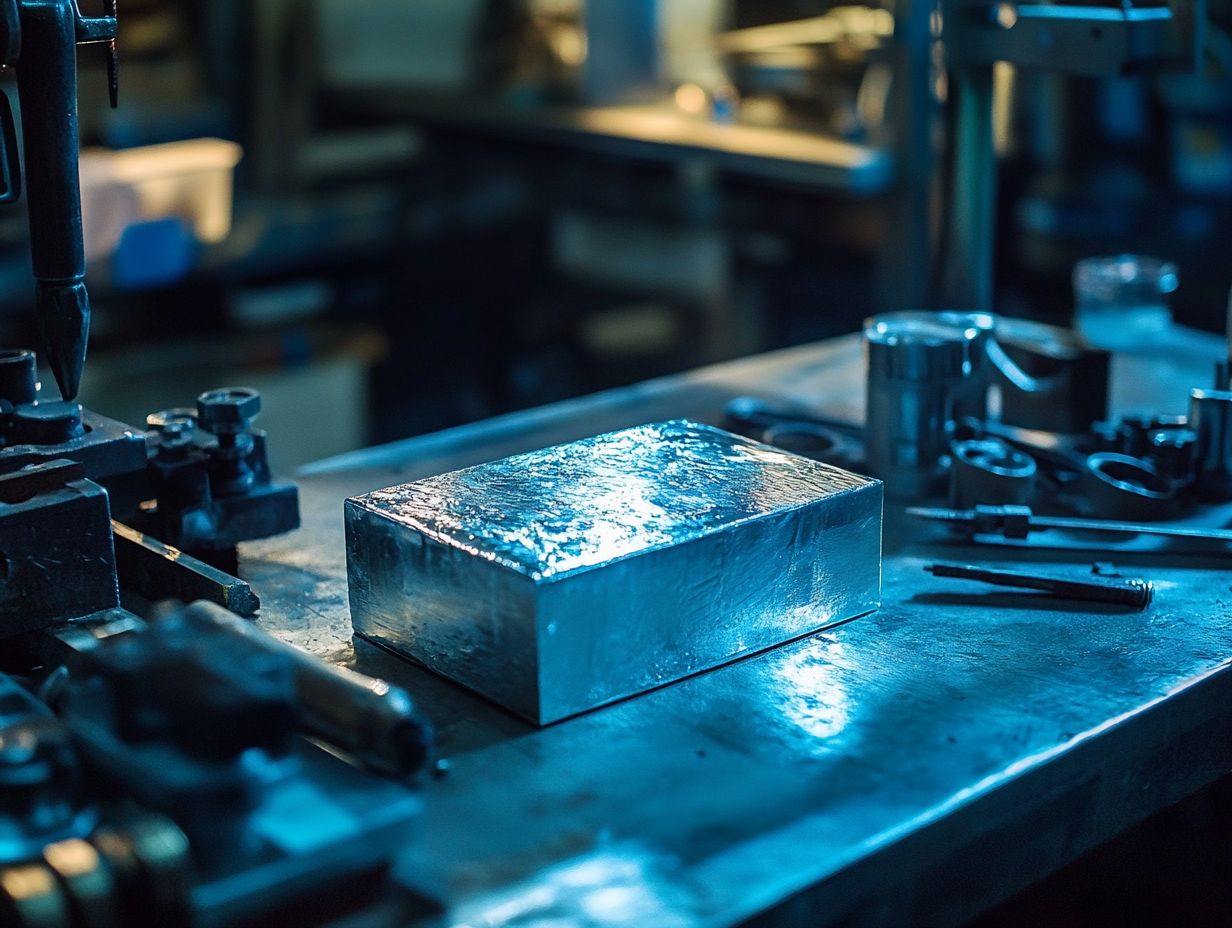The Importance of Platinum in Industrial Applications
Did you know that platinum is more than just a precious metal? It s a game-changer in various industries. Platinum holds a vital position in numerous industrial applications thanks to its unique properties and characteristics. It enhances efficiency in the automotive and chemical industries, transforms electronics, and elevates medical technologies its versatility truly knows no bounds.
However, using platinum does present challenges, such as cost and availability. Let s dive into the fascinating world of platinum and uncover its vital role, benefits, limitations, and future prospects for this remarkable metal within industrial processes.
Contents
Key Takeaways:

- Platinum’s unique properties make it a crucial element in various industries, including automotive, chemical, electronics, and medical.
- Using platinum in industrial processes offers benefits such as efficiency and reduced environmental impact, but cost and availability can be limiting factors.
- The future of platinum in industrial applications looks promising, with potential advancements and developments on the horizon.
The Role of Platinum in Industrial Applications
Platinum is a precious metal celebrated for its exceptional corrosion resistance and high melting point. It serves a vital role in numerous industrial applications, particularly within the automotive and medical sectors. Its distinctive chemical properties render it an ideal candidate for devices that help reduce car pollution, which are essential for reducing emissions in the automotive industry. Platinum is also crucial for making durable medical devices that prioritize reliability.
As you explore the landscape of modern manufacturing, the demand for platinum is steadily increasing, driven by its diverse applications from facilitating chemical reactions in industrial processes to its significant role in electronics and jewelry production. This versatility underscores the importance of quality assurance in platinum in today’s manufacturing realm.
Overview of Platinum’s Properties and Characteristics
Platinum is a precious metal that stands out for its exceptional chemical properties, including a high melting point and remarkable corrosion resistance. These qualities make it invaluable across various industries. As part of the platinum group metals, it boasts an inertness that allows it to thrive in harsh environmental conditions, making it ideal for applications ranging from industrial processes to medical devices.
This inertness means platinum doesn t easily react with other elements, which is particularly advantageous in catalytic converters found in automobiles. Here, it facilitates the conversion of harmful gases into less toxic emissions without breaking down itself.
In the world of electronics, its high electrical conductivity is crucial for manufacturing components like connectors and sensors, ensuring reliability and performance even in extreme conditions. In the pharmaceutical industry, platinum compounds are utilized in anti-cancer medications, showcasing its versatility and significance beyond mere industrial applications.
These remarkable qualities highlight why platinum continues to be a vital resource in modern advancements.
Uses of Platinum in Different Industries
Platinum finds its way into various industries, with each one harnessing its exceptional properties to boost performance and efficiency. In automotive manufacturing, platinum-based devices that help reduce car pollution are essential for ensuring adherence to environmental regulations.
Meanwhile, in the medical sector, platinum s biocompatibility shines, making it an ideal choice for surgical instruments and cancer treatment devices.
Automotive Industry
In the automotive industry, platinum plays a critical role, especially in catalytic converters. It acts as a catalyst to turn harmful pollutants into less dangerous emissions.
This helps reduce pollution and boosts vehicle efficiency. Platinum is truly an invaluable asset in achieving cleaner transportation solutions.
As vehicles adopt fuel-efficient technologies, the demand for platinum remains vital. It helps convert harmful gases, ensuring compliance with strict environmental regulations.
Innovation in electric and hybrid vehicles also depends on platinum, especially in fuel cell technology, which enhances energy efficiency.
Using platinum showcases a commitment to improving the automotive industry while promoting a sustainable future through reduced ecological footprints.
Chemical Industry

In the chemical industry, platinum is a key player in various chemical reactions, acting as a catalyst that accelerates reaction rates and boosts efficiency. Its unique properties enable it to facilitate complex industrial processes while maintaining stability.
This essential role streamlines production and contributes to lower energy consumption, which is increasingly vital as sustainability concerns rise.
Platinum s role as a catalyst goes beyond traditional methods; it is pivotal in advancing green technologies and cleaner processes, which help reduce harmful emissions.
Recycling platinum is crucial in this sector, allowing for the recovery of valuable resources and minimizing waste. Incorporating recycled platinum into new catalysts enhances sustainability while lowering operational costs without sacrificing quality.
Electronics Industry
In the electronics industry, platinum is highly favored for its exceptional electrical conductivity and durability. This precious metal is the go-to choice for crafting high-performance electrical devices.
Its alloys are frequently employed to enhance performance and longevity across various applications, from electronic sensors to connectors.
Platinum is pivotal in producing components like capacitors and resistors, where precision and reliability are essential. Recent advancements in nanotechnology which refers to the manipulation of matter at a molecular scale have skyrocketed the use of platinum in miniaturized electronic applications, enabling the development of compact yet efficient devices.
Furthermore, innovations such as platinum-based catalysts are enhancing energy efficiency in fuel cells. The versatile properties of platinum make it essential in the quest for smarter, more sustainable electronics, driving both performance and innovation in the industry.
Medical Industry
Platinum s biocompatibility and remarkable resistance to corrosion position it as a vital material in the medical field, where it is woven into an array of medical devices and surgical tools.
From platinum-based drugs used in cancer treatment to sophisticated devices implanted within the body, its applications are essential for advancing medical technologies.
Its unique properties facilitate the crafting of durable surgical instruments and ensure that these tools significantly reduce the risk of infection and complications during procedures.
Platinum compounds play a pivotal role in chemotherapy, effectively targeting cancer cells while sparing healthy tissues from harm. This versatility and efficacy reinforce platinum’s significance in shaping innovative therapies and enhancing patient outcomes, marking it as an invaluable asset in the continuous evolution of healthcare practices.
Benefits of Using Platinum in Industrial Processes
Utilizing platinum in industrial processes provides a wealth of advantages, enhancing both efficiency and effectiveness especially in applications that demand exceptional durability and corrosion resistance. Its distinctive properties not only extend the lifespan of products but also reduce downtime, positioning it as the premier choice for a diverse range of applications across multiple industries.
Efficiency and Effectiveness
Platinum significantly boosts efficiency and effectiveness in industrial processes, particularly in catalytic reactions (chemical reactions that help speed up processes). It enhances reaction rates and optimizes resource utilization, allowing for more efficient chemical transformations. As a result, you experience reduced operational costs and heightened productivity.
In sectors like petrochemicals, automotive manufacturing, and pharmaceuticals, platinum catalysts play a vital role in streamlining production workflows and minimizing energy consumption. For instance, in the automotive industry, implementing platinum in catalytic converters has dramatically reduced harmful emissions, enabling compliance with stringent environmental regulations while simultaneously enhancing vehicle performance.
Similarly, in pharmaceuticals, platinum-based catalysts are crucial for facilitating complex synthesis processes, particularly in the production of anti-cancer drugs where efficiency in yielding high-purity compounds is paramount. Case studies show that companies employing platinum catalysts not only optimize their processes but also gain a significant competitive edge, making it an invaluable asset in modern industrial operations.
Environmental Impact

Using platinum in industrial processes has a powerful impact on our environment, particularly in its role in reducing pollution through catalytic converters that minimize harmful vehicle emissions. By recycling platinum, you enhance its sustainability, allowing industries to embrace more eco-friendly solutions without sacrificing performance.
This precious metal is essential across various sectors, including automotive, electronics, and renewable energy, facilitating the development of cleaner technologies. By enabling more efficient combustion processes and cutting down on toxic byproducts, platinum plays a crucial role in improving air quality. As industries increasingly adopt circular economy principles (which refer to reusing and recycling materials to minimize waste), reclaiming platinum from discarded products helps conserve resources and lessen mining-related gas emissions.
Thus, the diverse applications of platinum not only drive innovation but also encourage a greener approach to manufacturing and consumption, propelling society closer to achieving its sustainability objectives.
Challenges and Limitations of Platinum Usage
While platinum offers a wealth of advantages, utilizing it comes with its own set of challenges, especially regarding cost and availability. These factors can create considerable hurdles for industries eager to adopt platinum-based solutions.
Extracting and processing platinum often involves hazardous materials, adding complexity to its industrial applications.
Cost and Availability
The cost and availability of platinum can present significant challenges for many industries, given its status as a precious metal subject to the caprices of commodity trading. This market volatility complicates decision-making for sectors that rely on platinum in their manufacturing processes.
For example, automotive manufacturers often struggle to secure this crucial component for catalytic converters. Fluctuations in global demand can create tight supply conditions, making their task even more daunting. As industries contend with these price dynamics, they must also navigate the complexities of a global supply chain heavily reliant on mining operations concentrated in specific regions.
As a result, sourcing difficulties can arise, impacting production timelines and driving up operational costs. These factors highlight the necessity for strategic planning and risk management to mitigate the financial repercussions of platinum market fluctuations, ensuring you can maintain efficiency in your operations.
Alternatives to Platinum
Given the challenges tied to platinum usage, several alternatives have emerged, especially in substances that help reduce pollution. These alternatives may include other precious metals or innovative materials that offer similar advantages, though their effectiveness and environmental impact can vary.
For example, consider palladium. It has gained popularity as a viable substitute due to its remarkable catalytic properties. Keep in mind that it often costs more than platinum. Alternatively, nickel is being explored as a more abundant and cost-effective option, although it may not deliver the same efficiency under specific conditions.
Researchers are also investigating various carbon-based materials, like graphene, which could present lower environmental footprints. However, the long-term stability of these materials in industrial applications is still under scrutiny. The diverse performance metrics and economic implications of these substitutes highlight a complex landscape. Your choice of material will depend on application-specific needs and sustainability considerations.
The Future of Platinum in Industrial Applications
The future of platinum in industry looks promising! Ongoing advancements in technology and manufacturing are set to enhance its usefulness.
Your investment in platinum is likely to yield rewards, driven by rising demand across various sectors, especially within the automotive and medical industries.
Advancements and Potential Developments

Recent advancements in platinum-related technologies have unveiled exciting new possibilities, particularly in medical technologies and eco-friendly solutions designed to minimize environmental impact. These developments indicate a significant shift toward more sustainable and efficient uses of platinum across various sectors.
Innovations like platinum-based nanoparticles are redefining targeted drug delivery systems. They significantly boost treatment efficacy while reducing side effects. In the sustainability arena, researchers are harnessing platinum’s catalytic properties to enhance hydrogen fuel cells, offering promising avenues for cleaner energy production.
These breakthroughs not only improve the performance and longevity of medical devices but also prioritize environmental health. They align seamlessly with global initiatives toward greener technologies. As these advancements continue to emerge, the versatility of platinum becomes increasingly clear, potentially setting a new benchmark for industries focused on efficiency and sustainability.
Frequently Asked Questions
What is the importance of platinum in industrial applications?
Platinum is a highly valuable metal that has a wide range of uses in various industrial applications. Its unique physical and chemical properties make it essential in many industries.
How is platinum used in the automotive industry?
Platinum is a key component in catalytic converters, which reduce harmful emissions from vehicles. It is also used in the production of fuel cells for electric cars.
What role does platinum play in the production of electronic devices?
Platinum is used in manufacturing electronic components such as hard disk drives, LCD screens, and computer memory chips. Its high thermal and electrical conductivity makes it a desirable material for these applications.
Why is platinum important in the medical field?
Platinum is a metal that is compatible with the human body. It is used in medical devices and equipment such as pacemakers, dental implants, and chemotherapy drugs. Its inert nature and resistance to corrosion make it safe for use inside the human body.
How does platinum contribute to the production of fertilizers?
Platinum is used as a catalyst in fertilizer production, which is essential for agriculture and food production. It helps convert ammonia into nitric acid, which is used to make fertilizers.
In what other industrial applications is platinum used?
Platinum plays a vital role in several industries. It’s used in making glass, petroleum, and chemicals.
It also acts as a substance that speeds up chemical reactions in the production of silicone and other high-performance materials. This makes platinum incredibly valuable in modern manufacturing!















